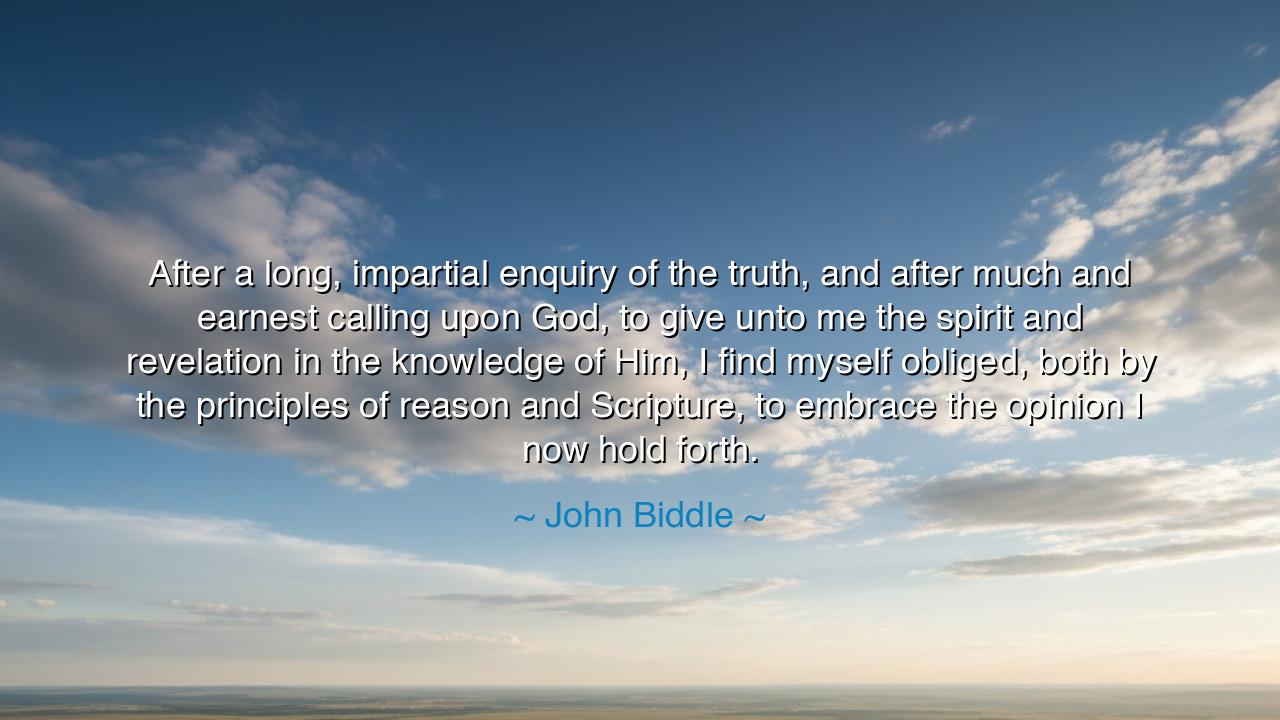
After a long, impartial enquiry of the truth, and after much and
After a long, impartial enquiry of the truth, and after much and earnest calling upon God, to give unto me the spirit and revelation in the knowledge of Him, I find myself obliged, both by the principles of reason and Scripture, to embrace the opinion I now hold forth.






“After a long, impartial enquiry of the truth, and after much and earnest calling upon God, to give unto me the spirit and revelation in the knowledge of Him, I find myself obliged, both by the principles of reason and Scripture, to embrace the opinion I now hold forth.”
Thus spoke John Biddle, a man of conscience and courage, whose voice rose amid the tempest of seventeenth-century England — an age when the freedom to think was often paid for in chains or blood. In these words, Biddle reveals not only his personal conviction, but the timeless struggle of all who seek truth in a world of dogma and division. His declaration is both humble and heroic — the confession of a soul who has searched deeply, prayed earnestly, and dared to stand by the light of conscience even when that light burned against the darkness of orthodoxy.
When Biddle speaks of a “long, impartial enquiry of the truth,” he invokes the ancient and sacred duty of the mind — the duty to question, to seek, and to test. His inquiry was not driven by rebellion, but by reverence. He sought not to overthrow belief, but to purify it. In his time, doctrines were wielded like swords, and to dissent from the established church was to risk one’s very life. Yet Biddle, moved by both reason and Scripture, pursued truth beyond the safety of conformity. His was not the arrogance of skepticism, but the humility of a pilgrim who refuses to rest until he has reached the holy city of understanding.
He speaks next of “earnest calling upon God” — a phrase of deep and trembling sincerity. For Biddle understood that reason, mighty though it is, cannot alone pierce the veil of mystery. The mind may examine, but only the spirit may discern. Thus, in his search, he joined prayer with study, faith with intellect, knowing that truth must satisfy both the heart and the mind. He sought the “revelation in the knowledge of Him,” not as one seeking to justify his opinion, but as one yearning to know his Creator more truly. In that balance — between inquiry and devotion — lies the greatness of his soul, and the lesson of his life.
The origin of this declaration lies in Biddle’s defiance of the doctrine of the Trinity, a belief that dominated Christian thought for centuries. Guided by his reading of Scripture and his reasoned reflection, he concluded that this mystery, as taught, could not be reconciled with the unity and simplicity of God as revealed in the Bible. For this conviction he was branded a heretic, imprisoned repeatedly, and persecuted until his death. Yet through it all, he refused to recant. His words, then, are not the cold pronouncement of theory, but the testimony of one who has suffered for truth’s sake. In his courage, we hear the echo of every thinker and believer who has stood against the tide of fear for the sake of integrity.
Consider, for example, the story of Galileo Galilei, who, in another realm of thought, faced a similar trial. He too made a “long, impartial enquiry of the truth,” studying the heavens until he saw what others would not — that the earth itself moved around the sun. When summoned before the power of the Church, he prayed, reasoned, and pleaded for understanding, but at last was condemned. Like Biddle, he bowed to no authority but that of truth. Both men, though separated by discipline, shared one faith: that reason and divine revelation, rightly understood, are never enemies, for both proceed from the same eternal Source.
Biddle’s teaching carries a message as relevant now as it was in his age. He reminds us that truth is not inherited — it must be discovered. Each generation must seek it anew, through the twin labors of the mind and the spirit. To follow reason without reverence is to risk arrogance; to cling to faith without understanding is to court blindness. But when these two — reason and revelation — walk together, the path of wisdom unfolds. True faith is not imposed by fear, but embraced by conviction born of experience and reflection. It is the flame kindled within, not the torch thrust upon us by others.
Therefore, O seeker of truth, take Biddle’s example to heart: question courageously, pray earnestly, and stand faithfully. Do not be content with secondhand belief, nor ashamed of honest doubt. Let your reason serve your faith, and your faith enlighten your reason. When you search, do so impartially; when you find, hold fast to what conscience confirms. For the world may change its doctrines, and powers may rise and fall, but the spirit of the sincere inquirer is eternal. He who seeks truth in humility and lives it in courage walks not in heresy, but in holiness.
And so, the wisdom of John Biddle endures — that the truest religion is not the creed we recite, but the conviction we live. When a man’s obedience to reason and revelation keeps pace with his love for God, he becomes a disciple not of men, but of truth itself. Such a soul, though persecuted, is free; though condemned, is exalted. For in the end, the seeker who joins faith with understanding, and who dares to follow the light that God gives him, holds within himself the very key to divine knowledge — and, by it, the freedom of the spirit.






AAdministratorAdministrator
Welcome, honored guests. Please leave a comment, we will respond soon